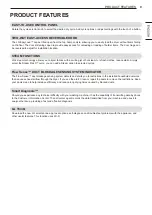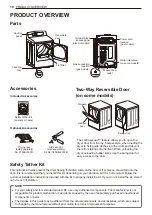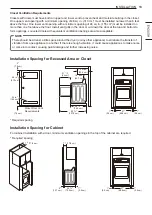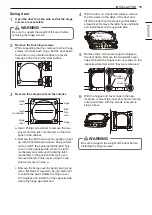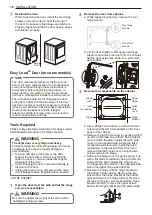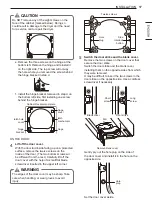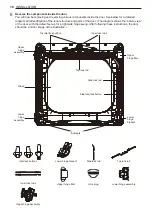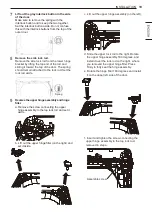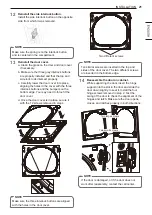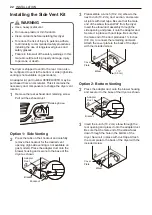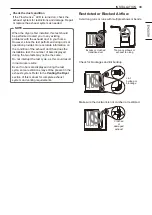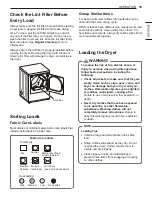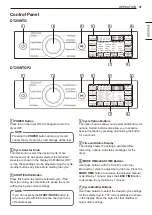
23
INSTALLATION
Venting the Dryer
WARNING
To reduce the risk of fire or explosion, electric
shock, property damage, injury to persons or
death when using this appliance, follow basic
safety precautions, including the following:
•
Do not crush or collapse ductwork.
Failure to
follow these instructions may result in fire or death.
•
Do not allow ductwork to rest on or contact
sharp objects.
Failure to follow these instructions
may result in fire or death.
•
If connecting to existing ductwork, make sure it
is suitable and clean before installing the dryer.
Failure to follow these instructions may result in fire
or death.
•
Venting must conform to local building codes.
Failure to follow these instructions may result in fire
or death.
•
Gas dryers MUST exhaust to the outdoors.
Failure to follow these instructions may result in fire
or death.
•
Use only 4-inch (10.2 cm) rigid, semi-rigid or
flexible metal ductwork inside the dryer cabinet
and for venting outside.
Failure to follow these
instructions may result in fire or death.
•
To reduce the risk of fire, combustion, or
accumulation of combustible gases, DO
NOT exhaust dryer air into an enclosed and
unventilated area, such as an attic, wall, ceiling,
crawl space, chimney, gas vent, or concealed
space of a building.
Failure to follow these
instructions may result in fire or death.
•
To reduce the risk of fire, DO NOT exhaust the
dryer with plastic or thin foil ducting.
Failure to
follow these instructions may result in fire or death.
•
The exhaust duct must be 4 inches (10.2 cm)
in diameter with no obstructions. The exhaust
duct should be kept as short as possible. Make
sure to clean any old ducts before installing
your new dryer.
Failure to follow these instructions
may result in fire or death.
•
Rigid, semi-rigid or flexible metal ducting is
recommended for use between the dryer and
the wall. All non-rigid metal transition duct
must be UL-listed. Use of other materials for
transition duct could affect drying time.
Failure
to follow these instructions may result in fire or
death.
•
DO NOT use sheet metal screws or other
fasteners which extend into the duct that
could catch lint and reduce the efficiency of
the exhaust system. Secure all joints with duct
tape.
Failure to follow these instructions may result
in fire or death.
•
Do not exceed the recommended duct length
limitations noted in the chart.
Failure to follow
these instructions may result in extended drying
times, fire or death.
•
Ductwork is not provided with the dryer. You
should obtain the necessary ductwork locally.
The vent hood should have hinged dampers to
prevent backdraft when the dryer is not in use.
Failure to follow these instructions may result in fire
or death.
•
The total length of flexible metal duct must not
exceed 8 ft. (2.4 m).
•
In Canada, only those foil-type flexible ducts,
if any, specifically identified for use with the
appliance by the manufacturer should be used.
In the United States, only those foil-type flexible
ducts, if any, specifically identified for use with the
appliance by the manufacturer and that comply
with the Outline for Clothes Dryer Transition Duct,
Subject 2158A, should be used.
Ductwork
Wall Cap Type
Number
of 90°
Elbows
Maximum length
of 4-inch (10.2 cm)
diameter rigid metal
duct
Recommended
4"
(10.2 cm)
4"
(10.2 cm)
0
65 ft.(19.8 m)
1
55 ft.(16.8 m)
2
47 ft.(14.3 m)
3
36 ft.(11.0 m)
4
28 ft.(8.5 m)
2
1
/
2
"
(6.35 cm)
Use only for
short run
installations
0
55 ft.(16.8 m)
1
47 ft.(14.3 m)
2
41 ft.(12.5 m)
3
30 ft.(9.1 m)
4
22 ft.(6.7 m)
NOTE
Deduct 6 ft. (1.8 m) for each additional elbow. Do
not use more than four 90° elbows.
Summary of Contents for DT25 T Series
Page 56: ...Memo ...
Page 57: ...Memo ...
Page 58: ...Memo ...
Page 114: ...Memo ...
Page 115: ...Memo ...
Page 116: ......

